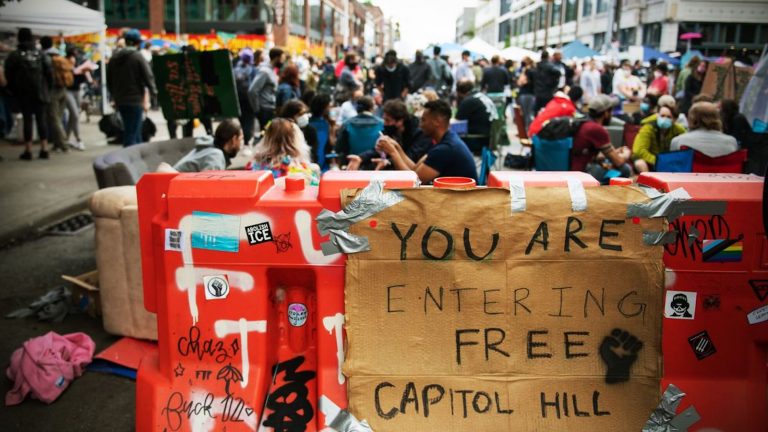It was a bit of a shock when the FBI announced they had successfully thwarted an attempt to violently overthrow the established government of Michigan and kidnap Governor Gretchen Whitmer. This is the first major headline of this kind in recent memory, and it was quickly followed by news of a kidnap plot of Virginia Governor Ralph Northam. It seemed wild, even for these times.
Yet, to be honest, we shouldn’t have been too surprised. In our awful, tragic culture war, we’ve been careening toward these sorts of outrageous tactics for quite some time. It doesn’t have to be this way. But for us to have peace, it would require our government to take about a hundred steps back.
Both sides of the political spectrum have been driven to violence. The politically right militia in Michigan aren’t much different from those leftists who engaged in the violent takeover of property in Seattle—the Capitol Hill Organized Protest (CHOP/CHAZ). Both events were attempts to seek peace through violence and the formation of an independent political entity that would change the shape of the current government—for the Michigan militia, a kangaroo court; for the Seattleites, an anarchic state. Furthermore, if you look closely, both events seem merely responses to excessive governance. There is a baseline of treatment we should expect from our government—namely, that it respect the constitutional rights of its citizens. In both cases, that trust was broken. CHOP revolted against systemic racism and police violence against minorities. The Michigan militia plan was a revolt against Whitmer’s unconstitutional overreach in the pandemic era.
Excessive financial and social pressure exerted by governments against their citizens leads to the creation of disenfranchised groups that feel isolated and unrepresented. Pushed enough, over enough time, those minorities inevitably start to think, “Hey, this isn’t working for us—what if we did our own thing?” This is the key breaking point.
Once a group decides to disassociate from governing institutions that they find oppressive, governments can either find peaceful resolutions that serve their constituents or they can double down and use the force of the state to ensure compliance.
When states and cities fail to respect constitutional rights, the results are bloody.
In Seattle’s CHOP, multiple blocks of businesses and private property were violated, and in the end CHOP had four shootings and several alleged sexual assaults to its name. Meanwhile, the Michigan militia were allegedly prepared to execute Governor Whitmer to achieve their goals. These are unacceptable results. How did we get here?
When faced with violence from the state, both the right and the left are responding with violence. It doesn’t make it right, but it’s certainly disingenuous to claim they were the first to use force to achieve their goals. The government was way ahead of them.
We should be working toward a system that allows for local control and minimizes the scale of these disagreements. States are simply too large to be managed effectively by a central state government. The same is true of the federal government—it’s an unwieldy large and vastly bloated bureaucracy. What you get in response to the government backing people into a corner are responses of erratic and violent frustration.
More directly, local control is the scale of governance laid out in the United States Constitution. The total population of the thirteen colonies in 1776 was roughly 2.5 million people—to provide a similar scale of localized governance, we would need 1,560 individual states.
It is no wonder that people feel that their government isn’t serving them, we’ve grown by orders of magnitude, and as a result we’ve lost one of the strengths from our founding: A human relationship with politics.
While forming 1,560 individual states isn’t currently a reasonable solution, we could find success relying more heavily on the 35,879 local governments in the USA. We should be empowering communities, stripping power from DC and state capitals who are too distant to be effective. The blueprint was written a long time ago, we just need to reacknowledge the importance of the 10th Amendment, which reserves for states and citizens those powers not enumerated in the Constitution.
Our strength as a nation, our diversity as a citizenry, and our respect for each other’s differences correlate. We’re the melting pot because we have room for all people to live in peace. Demanding local control ensures we can deliver on that promise.
Violence is not the answer, of course. But if we fail to reign in government powers, there will always be a disenfranchised “group” that feels underserved or abused by blanket policies, and we can expect that these kinds of violent tactics will continue. If they do, then we have no shot at a United States—and then what are we doing here?














Add comment